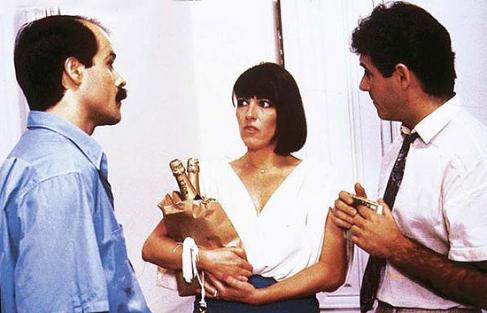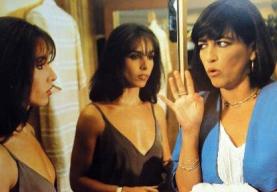
I first met Andrés when I was 16 or
17 years old. I walked into his film distribution company and said
that I was a journalist so that they would give to me some photos
of the Buster Keaton films, which were being rereleased for the
first time in Spain and distributed by Andrés. He says he remembers
me.
The next time I met him, he was
introduced to me by a mutual friend, Gonzalo Suárez, at the
premiere of "Parranda".
Then, third time lucky; I met him
again in 1985. I had finished my third film, "Sal Gorda", a year
and a half before. At that time I had only produced two films. One
Saturday afternoon the telephone rang and it was Andrés. He asked
me if I was interested in writing a script for him.
"It depends", I told him.
" Are you familiar with the play: Sé
infiel y no mires con quien?".
(Note: the original title in English
is "Move Over, Mrs. Markham)
"Of course, who isn't?" The play had
been on for ten years and was still showing. Mind you, all I had
seen of it was the trailer showing in theaters in which some
characters felt each other's asses and called that the Game of the
Goose. I hadn't seen the play and in fact it had never crossed my
mind to see it. It didn't matter though; Andrés would send me the
text. I agreed and we hung up. Half an hour later someone knocked
on the door. It was a messenger delivering the text. That was
quick, I thought. I left the envelope on a table, unopened. I'd
read it some other time. One hour later, the telephone rang again.
It was Andrés.
"Have you read it yet?"
"No, I thought I'd read it over the
weekend."
"Read it tonight and we'll see each
other tomorrow morning."
We agreed to meet at the Café de
Oriente the following day, on a Sunday morning. I got into bed and
read the play. I didn't find it at all interesting.
"You aren't going to do that, right?"
my wife asked me.
"Why not? Many movies we like are film
adaptations of plays or novels that are rather bad. It could be a
nice job for me."
The following morning Andrés and I got
together.
"I'm prepared to write the script for
you, but since I don't like the play, I'd have to make a lot of
changes. Therefore, if I were you I'd give the job to someone else,
because the work has been very successful, so why let an idiot like
myself change it...?"
"Look, if I make a screen version of a
work that has been so successful and we change everything and it is
a failure, people will think I'm crazy. However, if we make a film
that sticks to the original text and it's a failure then people
will think I'm a fool. I'd rather be taken for a loony than for a
fool."
"Does that mean I'm free to make
whatever changes I see fit?"
"Except the title."
"It's a horrible title."
"Yes, but people are familiar with it.
Besides, It cost me a fortune."
I started working on the script and,
as is usually the case, I fell behind and didn't meet the deadline.
Andrés started to suspect that I hadn't written anything, so one
day he asked me to give to him whatever I had. I gave to him the
first 90 pages of the script. I hadn't written the end yet.
However, he liked it so much that he offered me to direct the film
myself. And he wrote a draft of our first contract on a paper
napkin. That marked the beginning of a long personal and
professional relationship, which so far has lasted over 16
years.
In fact, the project wasn't crucial
for Andrés, and yet behind it dwelt an eternal dream of his: the
studio. Throughout all these years, that dream has been
continuously dropped and taken up again. At the time, Gerardo Vera
had built some wonderful set designs for the series "Los Pazos de
Ulloa", by Gonzalo Suárez, and the mere thought that the material
in question was going to be destroyed after the series was over, or
recycled for other projects as usually happens in the studios,
drove Andrés crazy. He looked for a quick project in which to use
the set designs and recover his investment. And the project was
none other than: "Sé infiel..." That is how I became involved with
Andrés.

The movie was really successful and
represented Andres's return to the production of movies after
having left it for several years to focus on distribution. Since
that time, Andrés hasn't stopped. I finished the shooting on a
Saturday and the following Monday, Almodóvar was filming
"Matador".
Andrés didn't wait for the box office
returns of "Sé infiel..." to hire me for his next project. While I
was shooting, he had already asked me what else I was interested in
doing after I finished. I told him the story of "El año de las
luces" (The Year of Enlightenment), I said that was what I wanted
to work on and that I wanted to write the script with Azcona. Said
and done. When I finished filming, I'd work on the editing of "Sé
infiel..." with Carmen Frías in the morning and in the afternoons
I'd meet with Azcona to work on the new script.
Our third movie project was a little
more complicated. I had given Andrés the novel by Christopher Frank
"The Dream of the Mad Monkey," warning him that it wasn't a
commercial subject. Andrés didn't believe me. "I'm sure it'll be
okay". But when he had read it, he said:
"You were right. It is too depressing;
nobody will go and see it."
"I told you."
For several months, Andrés kept
offering me different projects, adaptations, etc... In May he said
he was going to Cannes by car and asked me to go with him. That way
we would have time to talk things over and try to decide what to do
next. I went with him. In the car, when we crossed into France I
think, he turned to me and said:
"You know what? The film you should do
is "The Mad Monkey" because that is the one you want to
do."
"You'd better think about it, it is
going to be very difficult."
"All the better."
When we arrived in Cannes, he got in
touch with Christopher Frank's agent, who came from Paris to talk
with us. He watched a screening of "El año de las luces" and when
we returned, Andrés already had the rights.
We wrote the script and Andrés put me
on a plane for Los Angeles. I hadn't been on a plane nor crossed
the Atlantic since my debut as a director (Opera Prima) in December
1981.
Andrés explained how things worked in
Los Angeles, which he knows like the back of his hand. He stayed
with me until we had got hold of the actor for the film.
I'll always be grateful to Andrés for
having embarked on a project like that. It isn't exceptional of
him; I've seen him do similar things many times, simply because he
believes in someone.

In the years that followed we
coproduced "Belle époque", "Two Much" and "La niña de tus ojos"
and, as I write this, I am already working on, "El embrujo de
Shanghai" (The Shanghai Spell).
In those 16 years, while I have made
seven films, he has produced sixty. Since our relationship is above
all one of friendship, during that period I have calculated that we
must have had dinner together about fifteen hundred times. That has
enabled me to experience in first person and at close quarters the
amazing adventure of somebody who has been capable of producing
such a large number of films in a country like ours. One wonders
what he would have done if he had a studio of his own, and It
wouldn't surprise me if he ended up having one. Although in actual
fact he already has it. Heisthe studio. His capacity for dreaming
and turning his dreams into reality is what makes him the most
unique and accomplished producer I have ever encountered and -from
what I've read - has ever lived. Because what makes a producer
special isn't the quantity of films he has produced, not even their
quality. For me, what makes Andrés an extraordinary producer and an
exceptional person is his capacity to challenge reality and defeat
it, his triumphs, again and again, over what is politically
correct, what is financially feasible or industrially possible, for
the benefit of all those of us who have made films with him, those
who have worked in them and, I hope, those who have seen his many
films.
When I contradict him, he usually
tells me that I am arrogant and vain. Well, as a matter of
fact,heis the one who is arrogant and vain. Not only that, he is
jealous, possessive, a big mouth, competitive, a manipulator, a
seducer, ambitious, devious, whimsical, fussy, capricious. But
there are three things nobody can ever say about him: no one can to
say that he is a coward, no one can say he is boring and no one can
ever say he is not generous.
FERNANDO TRUEBA.